Coaches of the past: How Jim McElwain became a household name
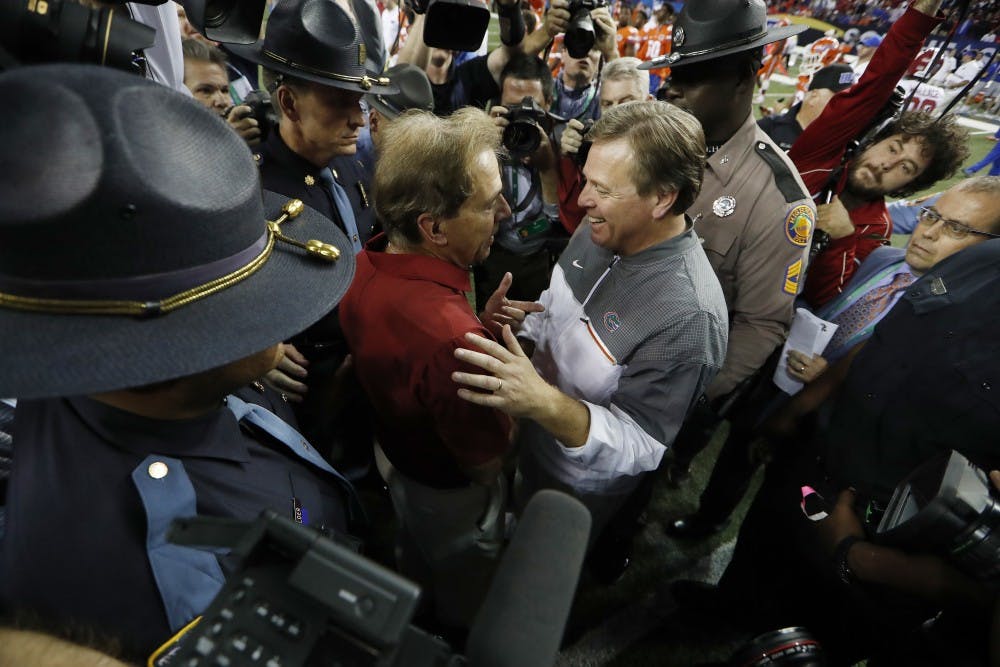
Just before 2008 National Signing Day, Jim McElwain received an offer from Nick Saban to become his offensive coordinator at Alabama.
McElwain spoke with Fresno State coach Pat Hill, his employer at the time, and questioned the impending decision he had to make.
“I don’t know if I should be doing this,” Hill recalled McElwain telling him.
“I’m going to help you pack your boxes; you’re leaving for Alabama,” Hill responded. “This is the best move you can make.”
Four years later, McElwain nabbed his first head coaching job at Colorado State and was named Mountain West Conference Coach of the Year in 2014. Three years after that, he went to Florida and won back-to-back SEC Eastern Division titles and was named SEC Coach of the Year in 2015.
All thanks to Hill’s advice.
“Good coaches have a burning desire to get going again,” Hill said. “At Fresno State, if you did a great job and good things come to you, I’ll be helping you along.”
The four coaches that influenced McElwain the most throughout his career were Dick Zornes at Eastern Washington, John L. Smith at Louisville and Michigan State, Hill at Fresno State and, of course, Saban at Alabama.
"(They) mean more than you could ever imagine," McElwain said. "They took a chance on me and gave me an opportunity. They mean everything to me."
When McElwain was hired at Central Michigan in early December 2018, it marked his 11th coaching destination since he finished his playing career as a quarterback at Eastern Washington in 1982.
The journey might not have always been simple nor easy to articulate, but McElwain learned something at each stop on the road to Mount Pleasant – through the ups and downs, wins and losses, successes and failures.
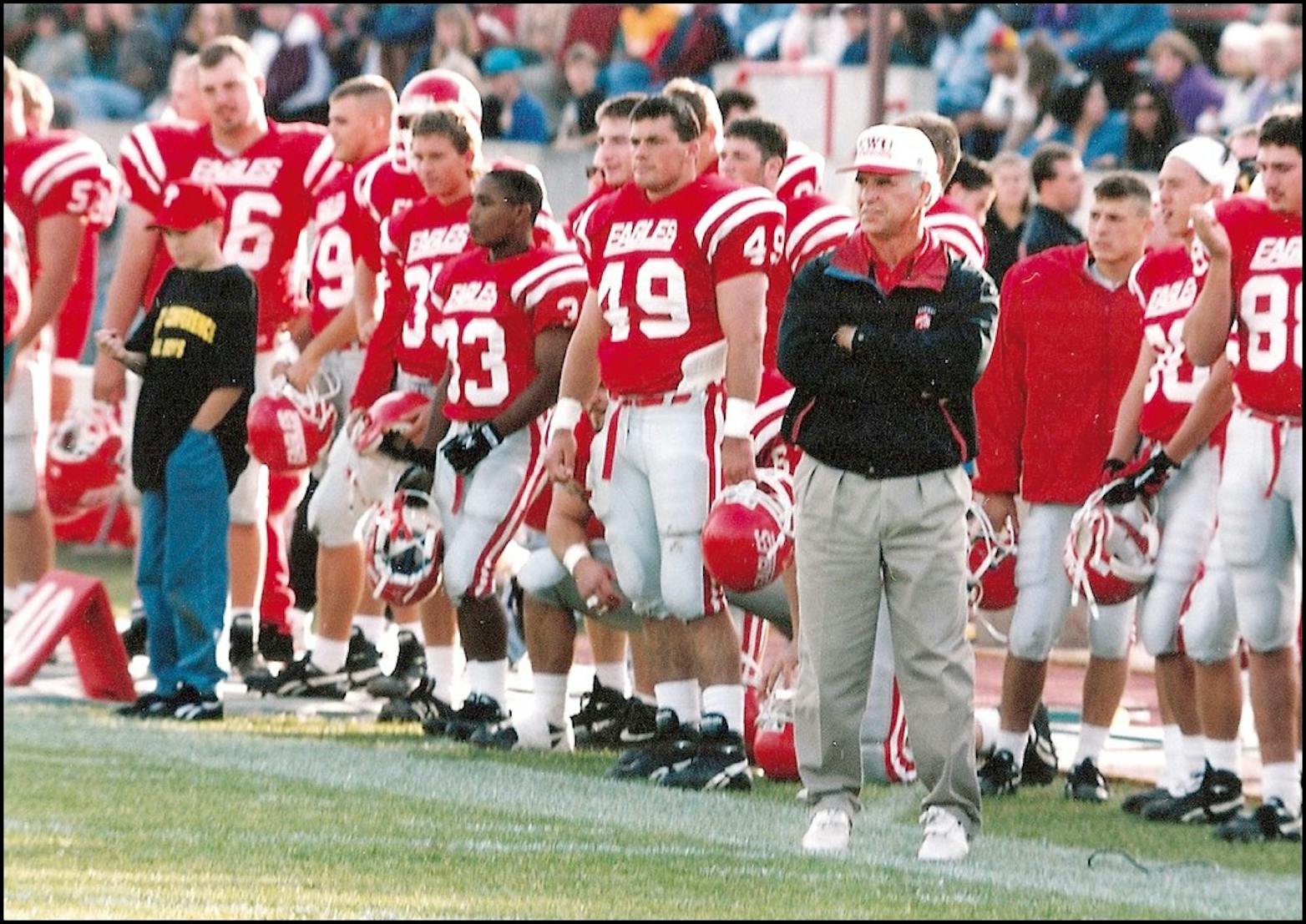
Dick Zornes: 'Honestly, I knew he'd move up'
Shortly after Zornes was hired as Eastern Washington's football coach in 1979, McElwain and his father, Frank McElwain, paid him a visit.
Zornes, now 75 years old, didn't know much about him and was just getting started with the program. There weren't a lot of options at the time.
"So, I said, 'OK,'" Zornes said, thinking back to when he decided to put McElwain on a partial scholarship to play quarterback.
Before the 1983 season, after McElwain had been with the program for three years, Zornes explained he was unlikely to ever get off the bench.
McElwain never lacked the football knowledge needed to be a college quarterback. He knew the offense like the back of his hand, and it helped keep him on the roster. As for the body and arm strength? It wasn't there.
Zornes wasn't ever going to start him and time was winding down, so a proposition was made.
"Jim, would you like to be a coach for us?" Zornes remembered asking 36 years ago. "Here's a way for you to keep your scholarship, and I think you'd be good at it."
And, oh boy, was Zornes ever right.
McElwain accepted the gig at 21 years old. He worked as an undergraduate student coach with a focus on wide receivers for the 1983-84 seasons before transitioning to a graduate assistant position from 1985-86.
That wasn't the end of the road. In 1987, Zornes made him the quarterbacks and wide receivers coach. McElwain didn't leave until 1994, one year after Zornes stopped coaching.
"The best thing that ever happened to him was that I quit coaching," Zornes said, jokingly. "If I hadn't stopped, he might still be at Eastern. Honestly, I knew he'd move up. He's ambitious."
The first coach always means the most, Zornes said. McElwain learned the basics of everything he currently knows from his time at Eastern Washington, from staying organized to becoming an offensive-minded coach with multiple schemes up his sleeve.
"I've seen him run a few plays we used to run," Zornes added.
McElwain was brought into a program that was willing to try new things, like the run and shoot offense. He was asked to help invigorate the offense and learn more about going for two after a score, Zornes said.
Turns out, that mentality helped McElwain down the road during a game while at Florida in a two-point conversation situation.
"I bet he runs 2014 pass special," Zornes thought to himself.
"And sure as hell he did," he exclaimed.
Zornes recollected this because he taught the play to McElwain. The Eastern Washington version was a play-action pass to the tight end on a drag-route, where blockers were ready to help him score on the backside. For McElwain, the call was exactly what he needed.
"It was a little different set, but it was basically the same play," Zornes said.
McElwain didn't just learn from Zornes on the field. He picked up a few things away from the game. When McElwain went on recruiting trips with the Eastern Washington staff, the group of five coaches would cram into one hotel room.
There were two double beds and one rollaway bed.
The budget was tight. McElwain had to learn to make something out of nothing.
That's why Zornes doesn't think McElwain will have any issues transitioning from Florida, an SEC powerhouse, to a smaller program like Central Michigan.
"He knows how to stretch a dollar," Zornes said. "It's like anybody. You don't need to have a Cadillac when a Volkswagen will get you where you need to go. What scares me to death is how much athletic (departments) are spending.
"You have to find ways to get by."
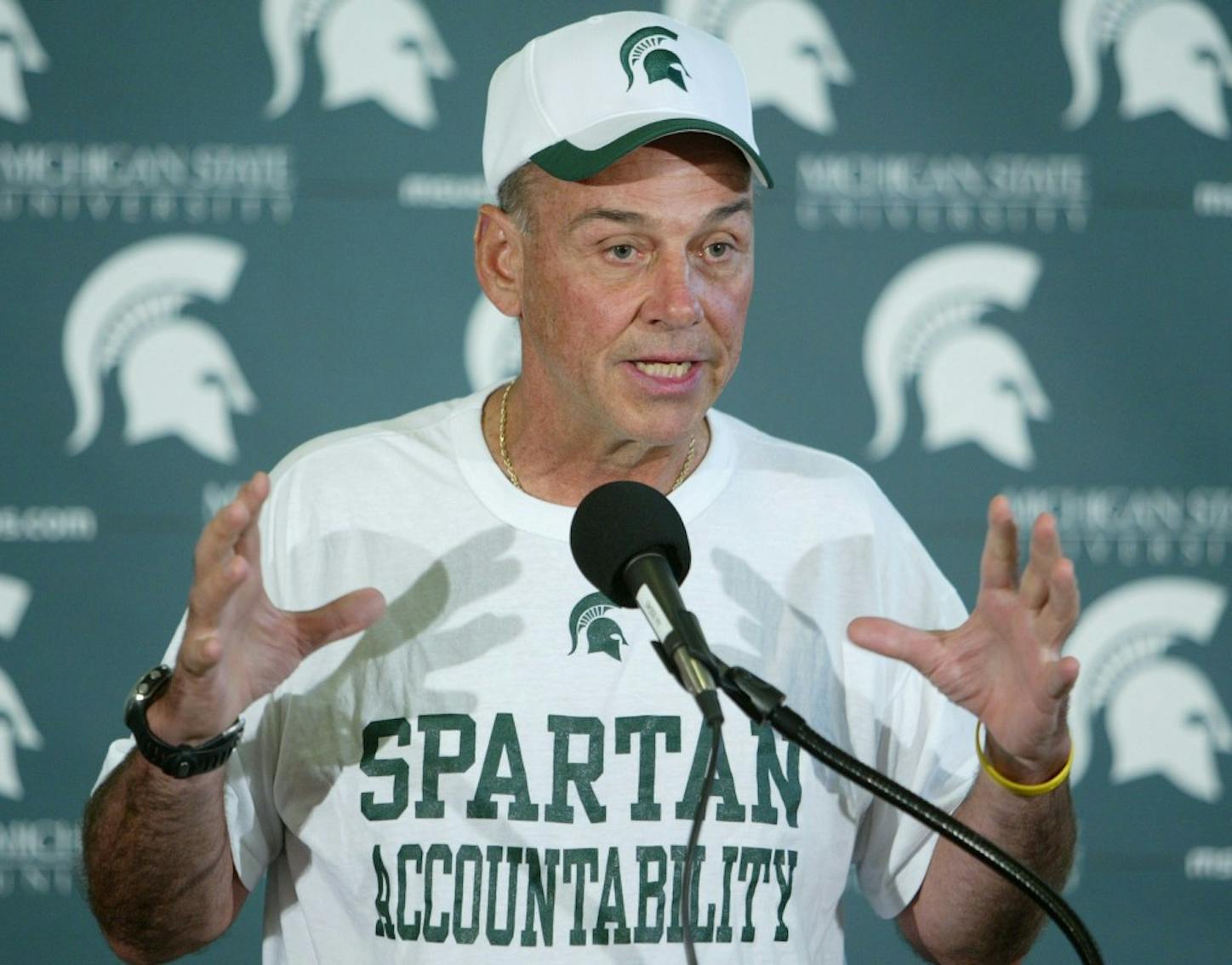
Michigan State coach John L. Smith talks about his team during media day Friday, Aug. 13, 2004, in East Lansing, Mich. (AP Photo/Al Goldis)
John L. Smith: 'I knew I could trust him'
Smith best described McElwain as an "old western bumpkin," a product of his lifestyle growing up in Montana and spending decades as a player and coach in the Big Sky Conference.
Turns out, Smith was the same way. He grew up in Idaho, played linebacker and quarterback for Weber State in the Big Sky and continued as a coach out west from 1971-97 at eight different programs.
But when Smith made the move to Louisville in Kentucky, he left the "old western bumpkin" mentality behind. McElwain did the same two years later, as he was hired by Smith as the wide receivers coach and special teams coordinator in 2000.
"I ended up hiring Jim, and he just flourished from there," Smith, 70, said. "I brought him in as a wide receivers coach, and then it got to the point where he could coach anything."
The relationship between McElwain and Smith didn't begin at Louisville. It all started with young McElwain as an assistant on the other side of the field against Smith, a head coach, from the mid-1980s to mid-1990s.
Once Smith moved away from the Big Sky to the Mountain West Conference in 1995, McElwain put it upon himself to make Smith a mentor for life.
"Coach, can I come down and spend the week with you guys to see what you’re doing and if that fits with what we want to do?" Smith remembered McElwain asking him once.
Smith agreed to help, and McElwain made the trip from Montana State to Utah State. It was there he had his first in-depth conversation with the longtime coach.
McElwain watched practices, asked a multitude of questions and took some of Smith's strategies and schemes back to Montana State coach Cliff Hysell.
"That’s how I got the respect for Jim, spending more time with him outside of the league," Smith said. "Some people are satisfied, but he wanted to go to clinics, people’s spring ball and spend a week at different places.
"That’s how you become good, and it’s what he has done throughout his entire career.”
Smith took Louisville to five-straight bowl appearances and back-to-back Conference USA titles in 2000 and 2001 with McElwain by his side. Due to the success, he accepted Michigan State's head coaching job in December 2002.
McElwain went with him for the ride as the associate head coach, wide receivers coach and special teams coordinator, and he stayed until the conclusion of the 2005 season before joining the Oakland Raiders as the quarterbacks coach.
Smith said he probably made his biggest coaching mistake when he hired McElwain. No, not the actual hire. Rather, it was the wide receivers coach role Smith placed him in.
"He should’ve been a coordinator right off the bat," Smith said. "When I got to Michigan State, that’s when I realized, ‘Dang, this guy is my rock. I rely on him.’”
The realization that McElwain was truly Smith's right-hand man occurred during the offensive meetings. There were times, Smith said, where McElwain proved himself as a smarter, more efficient assistant than the actual offensive coordinator.
McElwain made it a point to study the team's personnel to understand what the offense was and wasn't able to do. He also did everything in his power to take the top three playmakers and get them more touches.
"What he contributed, controlled and added to the concept was more like a coordinator than your actual offensive coordinator," Smith said. "I sat in the meetings and watched him manipulate the coordinator into doing what we should be doing. With Jim in the offensive room, I knew I could trust him in what was being developed. He didn’t do things that I wasn’t going to buy into."
The most important aspect of the game Smith thought McElwain was how to handle a group of young adults.
“What I tried to express to Jim was that guys aren’t going to mind you kicking them in the butt," Smith said. "They’re not going to mind you being hard on them, pushing them, being demanding and disciplining them as long as they know you love them. Always leave with a hug.
"Those players will run through a wall for you if they know you love them."
When McElwain left Michigan State for an assistant job with the Raiders, his boss said it hurt the team immensely. Smith was then replaced by Mark Dantonio a year later on Nov. 26, 2006.
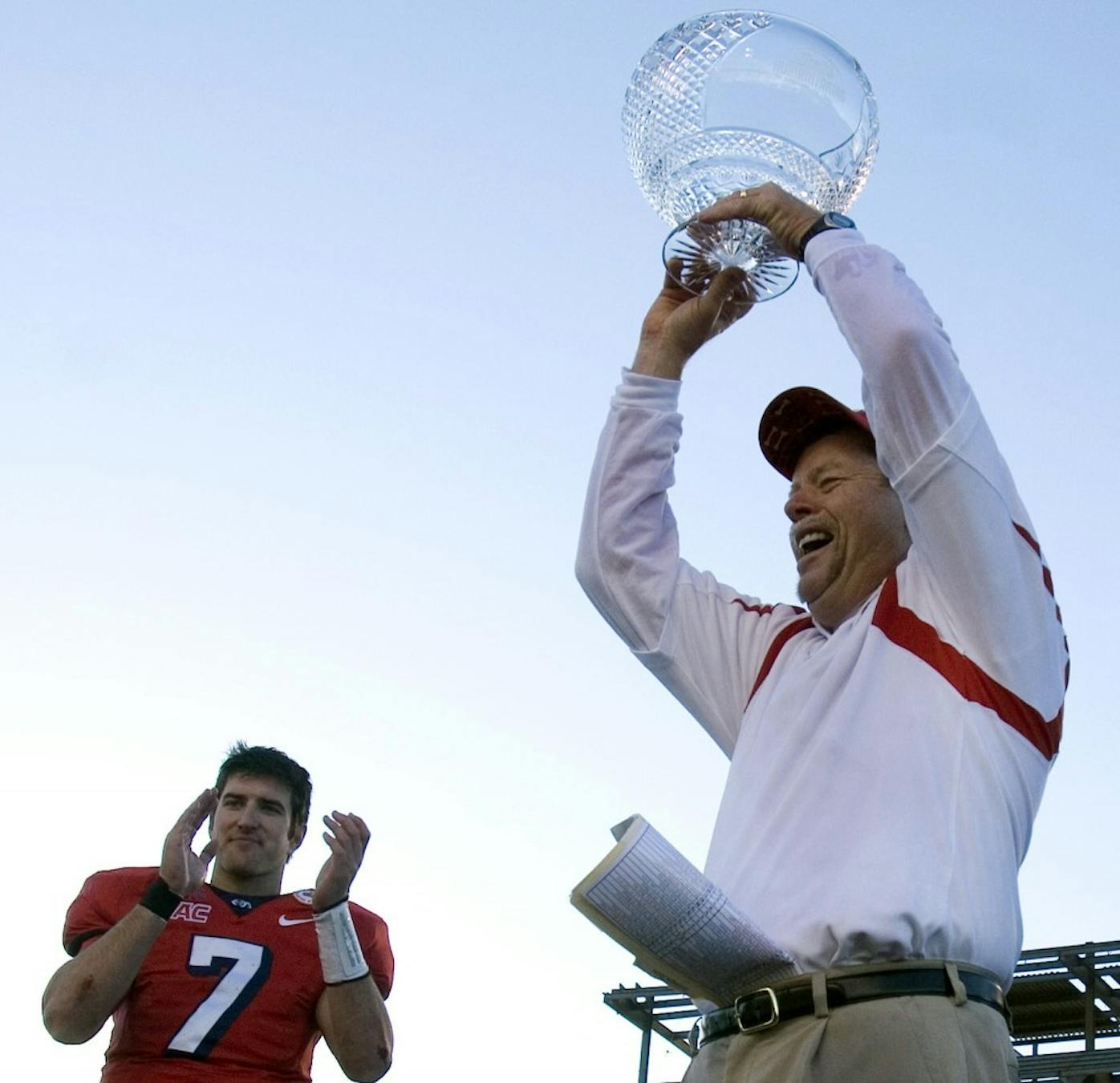
Pat Hill: 'He’s as good as any of them'
When Hill lost Frank Cignetti Jr., his offensive coordinator, to North Carolina following the 2005 season, he brought in Steve Hagen as a “late hire” to take over for the man in charge of the offense for the previous four seasons.
Under Hagen, the chemistry between the players wasn’t evident. In turn, there was a lack of trust in the system, and Fresno State went 4-8 overall in 2006.
Well, Hagen didn’t remain on staff, and it forced Hill to hire yet another offensive coordinator as his starting quarterback, Tom Brandstater, was entering his second to last campaign with the Bulldogs.
“I needed someone that could come get the kids back on track,” Hill, 67, said. “We didn’t have much money at that time. I told Jimmy, ‘You come, do a great job of turning this thing around, and you’ll be able to write a book and move on with your career.’”
McElwain was out of a job after his boss with the Oakland Raiders, Art Shell, was fired. He accepted the gig to work under Hill.
He became one of eight offensive coordinators in the 15 years Hill spent with the program.
“It got to the point where the athletic director (Thomas Boeh), believe it or not, wouldn’t even pay for their moves,” Hill said. “I was paying for McElwain’s move to Fresno State.”
Spending his own money for McElwain’s move from Oakland to Fresno was worth it. That year, the offense ranked No. 38 in the country, averaging 419.5 yards per game, and No. 32 in the nation with 32.9 points per game.
Hill described McElwain as a “master of formations,” someone that got the ball to the best players in different spots on the field through mismatches. He was outstanding at game planning personnel and knew the duties entire offense, even the front five on the line.
In less than a full year at Fresno State, McElwain was taught how to run a practice at a different pace than most schools in the country. Hill's athletes wore full pads and hit during first-team offense against first-team defense every Tuesday and Wednesday to breed toughness.
“Everyone talks about toughness, but it’s practicing toughness,” Hill said. “We didn’t have many injuries. I think what he learned was the physicality of practice.”
Being physical helped Fresno State keep up with a tough nonconference schedule that featured three road games per season against Power Five programs. Under Hill’s tutelage, the Bulldogs went 17-49 in those games. All but “three or four” were one touchdown games.
The Bulldogs finished 9-4 and capped off the 2007 season with a win over Georgia Tech in the Humanitarian Bowl.
“McElwain was the perfect hire,” Hill said. “I wanted to get guys out of pro schemes that thought the way I did. I didn’t want to go with the spread. We were a pro-style offense. Offensively, we were a 21-personnel, but what he brought was one (running) back, three wideout sets. We had the personnel to fit it.”
Fresh off Saban’s first season at Alabama in 2007, his offensive coordinator, Major Applewhite, left to become the running backs coach at Texas. Just like that, the second-year coach was left without an offensive coordinator as quarterback John Parker Wilson was entering his senior year.
Knowing Hill from their time together as assistants with the Cleveland Browns in the early 1990s under Bill Belichick, Saban inquired about McElwain. It helped that the Crimson Tide and Bulldogs were running the same offense at the time.
“Well, if you want a guy you can trust that can run your offense and do the things you want to do, you’d have to hire Jimmy,” Hill told Saban. “He’ll do a great job for you.”
Saban listened and hired McElwain shortly after the phone conversation. Turns out, his decision was a positive one.
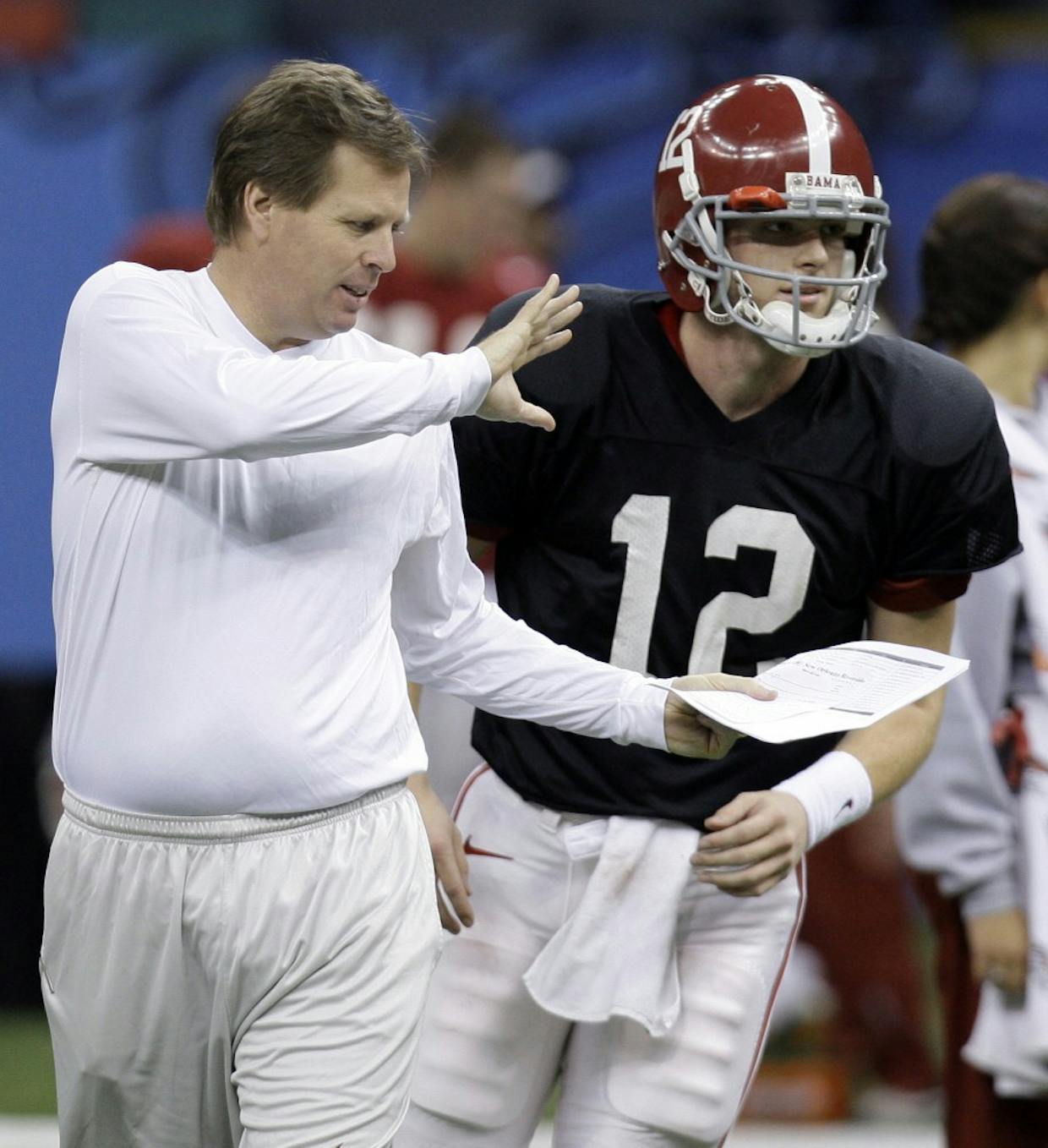
Nick Saban: ‘He is one of the best coaches we’ve ever had’
The 2008 season was Saban’s second in charge of Alabama, and he was trying to make a push after a poor 6-6 season the year prior. With the help of McElwain’s offensive mind, Alabama went 12-0 in the regular season before losing to Florida in the 2008 SEC Championship game and Utah in the 2009 Sugar Bowl.
McElwain was back at it in 2009, helping deliver Alabama to another 12-0 regular season mark. This time, however, it was the Crimson Tide that defeated the top-ranked Gators in the SEC Championship Game and went on to win the BCS National Championship Game over Texas.
Florida had the No. 1 overall defense at the time, and McElwain’s group torched them for 490 yards of offense. Greg McElroy was 12-for-18 passing for 239 yards and one touchdown, while Mark Ingram went for 113 yards and three scores on the ground.
“I have a tremendous amount of respect for Jim – he did a fantastic job for us here at Alabama,” Saban said. “He is a very down-to-earth kind of guy. He is a players coach, and the players are going to respond well to him at any level.”
Much of that success, Saban said, stemmed from McElwain ability to control the offense room and remain serious in his duties as a coordinator but also help everyone understand the enjoyment of the game by displaying a sense of humor.
Saban thinks of McElwain as “one of the best coaches” that has ever employed as an assistant on his staff in Tuscaloosa.
Alabama went 10-3 with a Capital One Bowl game victory over Michigan State in the 2010 season and won another BCS National Championship the following campaign.
“He is going to work hard to field the best team that he can,” Saban said. “He has enough perfectionist in him that he wants to get it done the right way. It is important to him that the players have fun with what they are doing."
When McElwain was at Alabama, he was using what he learned from Zornes, Smith and Hill while picking up new ideas from Saban. It was evident in what McElwain brought to the table, so Saban made sure to make note of it and teach him.
"Mac, you can't be John L., you can't be Pat Hill, you can't be Dick Zornes, you can't be Nick Saban. You have to be yourself," McElwain recalled Saban telling him. "Be who you are."
That was one of the best pieces of advice McElwain has ever received, if not the best, he said.
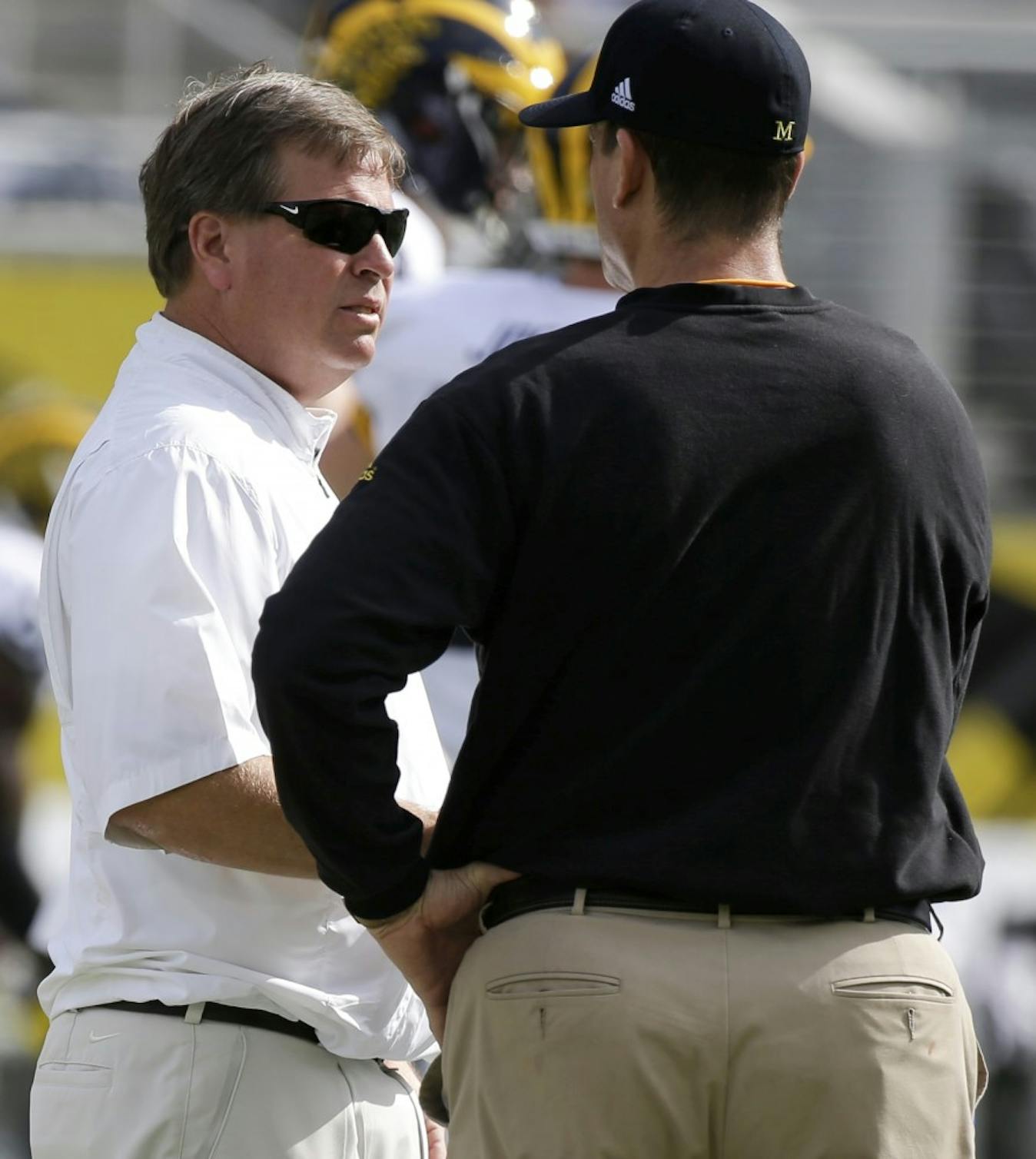
Jim Harbaugh: ‘I'm really excited for him’
Even though McElwain still keeps in contact with Zornes, Smith, Hill and Saban, he's now separated from them, on an island of his own in Mount Pleasant – brought in to rebuild a broken program.
Based on numbers alone, McElwain has shown that he can pick up a struggling program, hold it in the palm of his hand and set it back on track. The year before he took over at Colorado State, the Rams went 3-9 in 2011. He was 4-8 in his first year, 8-6 in year two and, finally, 10-3 in the 2014 season.
The same happened at Florida.
Under Will Muschamp, the Gators were 4-8 overall in 2013, missing a bowl game for the first time since being ineligible because of an NCAA probation in 1990. The next year, Muschamp’s team was just 4-4 in SEC play.
McElwain took over and immediately won back-to-back SEC Eastern Division championships, but 2017 was his fallout. His tenure concluded with him being fired from the job by Athletic Director Scott Stricklin.
Leaving Gainesville, McElwain was jobless.
But Harbaugh, who had beaten McElwain's Florida team 41-7 in 2016, saved the day. He signed him to a one-year contract as the wide receivers coach.
Hill said McElwain probably did much more than just coach the pass catchers.
"I bet you Jim (Harbaugh) leaned on him a lot," Hill said. "Jimmy McElwain’s a very smart football coach as far as offense, defense and special teams. He’s been around some great systems."
As that one-year contract was coming to a close, McElwain began job hunting for a head coaching position. He ended up at Central Michigan, signing a contract Dec. 1, 2018.
He called Harbaugh shortly after to explain his four-year deal with the Chippewas was official.
Before McElwain had a chance to speak a word, Harbaugh yelled, "Fire up Chips!"
"What do you even know about that," McElwain responded, jokingly.
"Well, my brother-in-law (Tom Crean) went there, so I hear it every time we get together as a family," Harbaugh said.
The next day, McElwain was in Mount Pleasant for his introductory press conference.
McElwain's coaching tree runs deep and spans each side of the country and everything in between. From his youthful roots in the Big Sky Conference to his experienced SEC days, the coaches of McElwain's past expect to see success in the future as he takes over at Central Michigan.
Zornes: "You got a good coach. You got a guy that's got experience, charisma and dynamics. People are going to like Jim. He's a likable guy. It probably isn't going to happen overnight, but I think you have the right guy to get you out of there. That's the good news."
Smith: "He’s going to do a good job there of identifying the right guys and get the program going. As long as he has support on the administrative level, and in talking to him, I think he does, he'll get it going."
Hill: “I think people at Central Michigan are fortunate to have him. He’ll do a really good job. Not only will he produce good football teams, he’ll do a great job with those kids."
Saban: "Jim has a wealth of experience being a head coach at Colorado State and Florida. He has proven he can really coach at a Power Five school or a non-power five school. He will do a great job at Central Michigan.”
Harbaugh: "I really like Jim a lot, and I'm really excited for him. I think that's a great fit."






